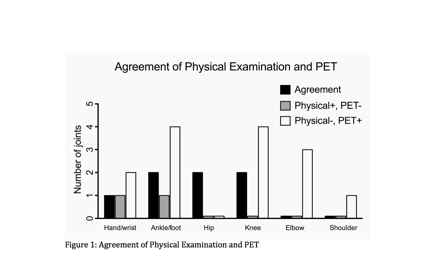Session Information
Session Type: ACR Poster Session B
Session Time: 9:00AM-11:00AM
Background/Purpose: Positron emission tomography (PET) can be used to identify inflammation using 18F-fluorodeoxyglucose (18F-FDG). 18F-FDG uptake correlates with clinical and laboratory markers of disease activity in adults with rheumatoid arthritis and in one previous study of juvenile idiopathic arthritis (JIA). The purpose of this study was to test the feasibility of combining the metabolic data from 18F-FDG PET with structural and functional data from MRI to assess disease activity in JIA.
Methods: Seven patients with polyarticular JIA according to ILAR criteria (6 RF-positive, 1 RF-negative) underwent 18F-FDG PET/MRI of the whole body and a dedicated scan of 1 joint/region. Each patient had a complete joint exam on the day of the scan. Patients were scanned using a weight-based, low-dose (0.5 megabecquerel/kg) 18F-FDG protocol to minimize radiation exposure, resulting in maximum effective dose less than 0.7 millisievert for patients weighing 55 kg or greater. Images were evaluated qualitatively, and joints were considered positive on PET if 18F-FDG localization was increased above background.
Results: Mean age was 15.1±2.9 yrs and median disease duration was 7.5±2.4 yrs. For 4 out of 7 patients, PET showed more positive joints than physical exam (see table). For 1 patient, physical exam showed 2 positive joints but PET was negative. Joints that showed disagreement between physical exam and PET included hand/wrist, ankle/foot, knee, elbow, and shoulder (see Figure 1). Disagreement between physical exam and PET did not correlate with any clinical characteristics including ESR, BMI, or Juvenile Arthritis Disease Activity Score (JADAS). MRI allowed localization of PET signal, for example allowing diagnosis of tenosynovitis in one patient (see Figure 2).
Conclusion: We found disagreement between physical exam and PET in 5 out of 7 JIA patients. PET detected more joints with inflammation than physical exam, and notably this disagreement often occurred in joints that are easily accessible on physical exam. 
To cite this abstract in AMA style:
Corbin KJ, von Scheven E, Seo Y, Behr S, MacKenzie J. Comparison of Clinical Parameters and PET/MRI in Juvenile Idiopathic Arthritis [abstract]. Arthritis Rheumatol. 2016; 68 (suppl 10). https://acrabstracts.org/abstract/comparison-of-clinical-parameters-and-petmri-in-juvenile-idiopathic-arthritis/. Accessed .« Back to 2016 ACR/ARHP Annual Meeting
ACR Meeting Abstracts - https://acrabstracts.org/abstract/comparison-of-clinical-parameters-and-petmri-in-juvenile-idiopathic-arthritis/


